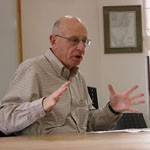
JERUSALEM — The country is unraveling. Coronavirus illnesses have spiked from a norm around 1,500 three weeks ago, then to 2,000, 3,000, and currently above 4,000.
Major centers are in the ultra-Orthodox towns and neighborhoods, and the Arab towns, but with other cases widespread.
We’ve seen pictures of mass weddings and the introduction of a new Grand Rabbi at one of the ultra-Orthodox congregations. The man was the 20-year-old son of the previous Grand Rabbi, dancing in the center of hundreds of followers clapping in applause.
There have also been concerts at secular weddings. And the nighttime lockdowns of some 40 locales seem to have passed with a minimum of observance and little enforcement.
Our personal notice during neighborhood walks is that 50 percent or less than those we meet are wearing masks.
There’s been a shrill televised argument between a well known ultra-Orthodox and a representative of the Bnei Brak city, with each talking over the other and calling one another a liar, with the media intermediary unable to control the commotion.
Bibi has engineered an agreement in the Coronavirus Committee for a two-week national lockdown to begin the day before Rosh Hashanah, to be followed by another two weeks of school closings, and then a return to the Corona Czar’s scheme of judging communities according to the severity of their outbreaks.
We’ll see how that works.
In advance of the government meeting to confirm the closure, the ultra-Orthodox Housing Minister resigned, saying that a closure over the Holidays would keep the religious from praying in synagogues.
That was the Health Minister with several years in office, allowing the hospitals to suffer from minimum budgets and declining beds and staff relative to patients. But he was good to the ultra-Orthodox.
There were quarrels from some physicians, serving as hospital administrators, as to how close they were to being overloaded. Several urged an avoidance of the total closure.
The Finance Minister and others argued for continued nighttime lockdowns. But we know that those are not being enforced in the 40 towns where they apply.
Several activists–restaurant owners and other independents–said they would not observe a total lockdown. Some threatened continued work unless that were provided advanced payments for what they would lose.
The medical chief of one of the major hospitals is arguing against a national closure. Instead he would have the people stick to their masks and avoid assembling.
And a distinguished retired military officer is arguing for a nation run by its professionals, without the politicians entering at every instance to favor their own constituencies.
Against him are reports that the IDF takeover of certain testing won’t be complete until November.
Apparently that center of professionalism needs more time to prepare its personnel.
Plus an outspoken Knesset Member is arguing with a distinguished physician, speaking over one another. With the physician arguing for closure and the Knesset Member noting that an increase in cases reflects an increase in testing, and that the incidence of serious cases has climbed only slightly.
Hospitals are complaining that they are near collapse. Operations postponed; physicians sick and/or exhausted. Care continues, but the quality is suffering.
Senior housing facilities are also problematic, with infections as well as indications of dehydration and depression. At the same time, an outburst of media advertisements, urging the aged to: come stay with us; we provide adequate medical care, as well as companionship, cultural and sport events..
And we should remember from a week ago, when Avigdor Lieberman called on the people to ignore the officials, and to decide what to do in their own best interest.
For the Sharkanskys, it’ll be Rosh Hashanah, Yom Kippur, and perhaps Sukkot just like Pesach. With the two of us at home, drinking wine and celebrating, or abstaining, while our kids and grandchildren do the same, each in their homes a half hour or 75 minutes from here.
The government approved a national closure for three weeks, from Rosh Hashanah through Sukkot, with all of us limited to a distance of 500 meters from home. Places that do not involve the arrival of the public can continue to work. And food stores and pharmacies will remain open, as well as medical facilities.
Was this a moment for Bibi to stand for a united Israel, after several days of being in the headlines working against the police and prosecutors, claiming they were politically intent on unseating him, and fabricating stories and demanding a Committee of National Inquiry?
There is public commotion about the Prime Minister’s flight to Washington for the signing of normalization with the UAE and Bahrain. He, along with his wife and two sons, were scheduled to travel on a private plane–not Israeli– while the official delegation would fly on something larger. Presumably to protect the Prime Minister from infection.
Two flights? At a time of general lockdown? Is even one of them necessary? And would the older son will be spending some of his time tweeting his extremism?
Public commotion led the Prime Minister to cancel his private flight, and to join the larger delegation.
To be sure, there is credit to be given to the cluster of Trump, Kushner, Bibi, as well as current professionals for the normalizations– currently with the UAE and Bahrain, with more promised. But the underlying relations, usually quiet, had been going on since Ariel Sharon was Israel’s Prime Minister.
Aside from the occasional good news, it’s time to wonder if the patients are in charge of the asylum. And if we’re all in there, more or less.
*
Ira Sharkansky is professor emeritus of political science at Hebrew University. He may be contacted via ira.sharkansky@sdjewishworld.com